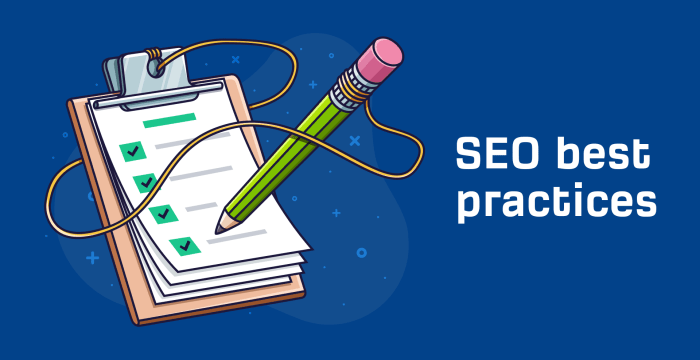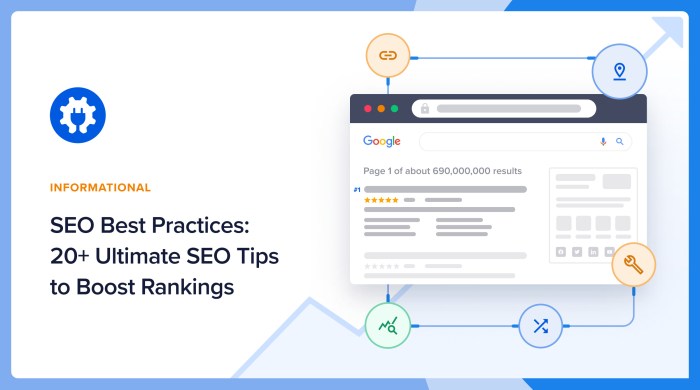SEO Best Practices – Best Practices, a crucial aspect of online visibility, delve into the key strategies and techniques to enhance your website’s search engine rankings. From on-page optimizations to off-page strategies, this guide will equip you with the knowledge needed to boost your online presence.
Whether you’re a novice or seasoned website owner, implementing these practices can make a significant difference in how your site performs in search results. Let’s explore the world of together and unlock the secrets to digital success.
On-Page Best Practices
When it comes to optimizing a webpage for search engines, on-page plays a crucial role in improving visibility and ranking. By focusing on key elements and best practices, you can enhance your website’s performance and attract more organic traffic.
Key Elements to Optimize on a Webpage, SEO Best Practices
- Quality Content: Ensure your content is relevant, valuable, and engaging for users. Use s strategically but avoid stuffing.
- Title Tags: Create unique and descriptive titles for each page, including relevant s.
- Meta Descriptions: Write compelling meta descriptions that summarize the content and encourage clicks.
- URL Structure: Use clean and descriptive URLs that include s related to the page’s content.
- Header Tags: Organize your content with proper header tags (H1, H2, H3) to improve readability and .
Importance of Meta Tags and Optimization
Meta tags, including title tags and meta descriptions, provide essential information to search engines about your webpage’s content. Optimizing meta tags with relevant s and compelling copy can improve click-through rates and visibility in search results.
Significance of Internal Linking
Internal linking helps search engines understand the structure of your website and the relationship between different pages. By strategically linking relevant pages together, you can improve navigation, distribute link equity, and enhance the overall performance of your site.
Tips for Creating High-Quality, -Friendly Content
- Research s: Identify relevant s and incorporate them naturally into your content.
- Optimize Images: Use descriptive alt text and file names for images to improve accessibility and .
- Focus on Readability: Make sure your content is easy to read, well-structured, and engaging for users.
- Update Regularly: Keep your content fresh and up-to-date to show search engines that your website is active and relevant.
Off-Page Best Practices

Off-page refers to the activities taken outside of your own website to impact your search engine rankings. This includes building backlinks, social media presence, and managing online reputation. These practices are crucial for improving your website’s authority and visibility on search engines.
Importance of Backlinks
Backlinks are links from other websites pointing to your site. They are important for search engines to determine the credibility and authority of your website. Quality backlinks from relevant and authoritative sites can significantly boost your search rankings.
- Focus on acquiring backlinks from reputable and niche-specific websites.
- Avoid buying backlinks or engaging in link schemes, as this can harm your website’s reputation.
- Guest posting on industry-related blogs can help you earn quality backlinks naturally.
- Create valuable and shareable content to attract organic backlinks from other websites.
Social Media in Off-Page
Social media plays a crucial role in off-page by increasing brand visibility, driving traffic to your website, and creating engagement with your audience. Leveraging social media effectively can enhance your online presence and boost your search rankings.
- Share your content on popular social media platforms to reach a wider audience.
- Engage with your followers and encourage them to share your content to increase visibility.
- Utilize social media analytics to track the performance of your posts and refine your strategies accordingly.
- Join relevant social media groups and participate in discussions to establish authority in your industry.
Online Reputation Management
Online reputation management is closely tied to , as a positive online reputation can improve your search rankings. Monitoring and managing online reviews, mentions, and feedback can help build trust with your audience and search engines.
- Respond promptly to customer reviews and address any negative feedback professionally.
- Encourage satisfied customers to leave positive reviews on review sites and social media platforms.
- Monitor brand mentions and respond to any queries or comments to maintain a positive online reputation.
- Regularly audit your online presence and address any inaccuracies or negative content that may impact your reputation.
Technical Best Practices: SEO Best Practices

When it comes to optimizing your website for search engines, technical plays a crucial role. These are the key technical aspects you need to focus on to improve your performance.
Site Speed Optimization
Optimizing your website’s speed is essential for success. A slow-loading site can negatively impact your search engine rankings. Here are some ways to improve site speed:
- Enable browser caching to reduce loading times for returning visitors.
- Optimize images by compressing them without losing quality.
- Minimize HTTP requests by combining CSS and JavaScript files.
- Use a content delivery network (CDN) to deliver content faster to users around the world.
Mobile Optimization
Mobile optimization is no longer optional – it’s a must for . With more users accessing websites on mobile devices, Google now prioritizes mobile-friendly sites in search results. Here’s how to implement mobile optimization:
- Use responsive web design to ensure your site looks good on all devices.
- Optimize images and videos for mobile viewing.
- Implement Accelerated Mobile Pages (AMP) to create faster-loading mobile pages.
- Test your site on mobile devices to ensure a seamless user experience.
Website Crawlability and Indexability
For search engines to rank your site, they need to be able to crawl and index your content effectively. Here are some tips to improve website crawlability and indexability:
- Create an XML sitemap to help search engines discover and index all your pages.
- Use robots.txt to control which pages search engines can crawl and index.
- Optimize your site’s internal linking structure to make it easier for search engines to navigate.
- Fix broken links and 404 errors that can hinder crawling and indexing.
Local Best Practices
Local is crucial for businesses with physical locations as it helps them attract nearby customers searching for products or services in their area. By optimizing their online presence for local searches, businesses can increase visibility, drive foot traffic, and ultimately boost sales.
Optimizing Google My Business Listing
To improve local search visibility, businesses should claim and optimize their Google My Business listing. This includes providing accurate business information such as name, address, phone number, and operating hours. It’s also important to choose relevant categories, upload high-quality images, and encourage customers to leave reviews.
Acquiring Local Citations
Local citations play a key role in local by establishing a business’s credibility and authority in a specific area. Businesses should ensure their NAP (Name, Address, Phone Number) information is consistent across all online directories and listings. Acquiring citations from reputable sources can help improve local search rankings.
Online Reviews and Reputation Management
Online reviews are a major factor in local , as they can influence a business’s reputation and visibility in local search results. Encouraging satisfied customers to leave positive reviews can help build credibility and attract new customers. It’s also important to address any negative reviews promptly and professionally to maintain a positive online reputation.
